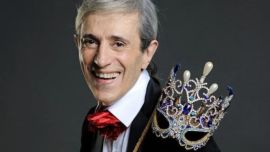If last Saturday’s column was a tall order in viewing the thousands of PASO primary nominations, today’s raises the bar considerably by taking on the Tokyo Olympics now entering into their last throes – a total of 11,656 athletes from 205 countries or territories competing for over 1,000 medals (1,017 to be exact without counting the twin medals such as the double gold so theatrically shared by the high jumpers of Qatar and Italy). But not to fret – since this is an Argentine publication, we will basically ignore the medal gluttons of China, the United States, the Japanese hosts, etc. to focus on local performance, thus drastically lowering the level of ambition.
Indeed, only a couple of medals at this late stage with national hopes this morning pinned on the volleyball team grasping a bronze from eternal rivals Brazil – somewhat humbling to see that, among many others, tiny San Marino has pipped us until now with three medals. At least an improvement on the first Tokyo Olympics of 1964 (just one equestrian silver medal) and indeed on all the other Games from then through to Atlanta in 1996 with shutouts in Montréal, boycotted Moscow and Los Angeles. But it is the leanest haul of a century which has thus far seen only 26 medals out of Argentina’s total haul of 74. Not that we should be blaming the athletes but rather a cruel coronavirus pandemic and a heavy-handed quarantine shredding their training opportunities. Nothing more here on these Olympics since any after-the-match inquest would be premature ahead of tomorrow’s closing ceremony.
Instead this column will stick to its brief of comparing past and present with the help of a Buenos Aires Herald newsroom experience stretching back to the 1984 Games in Los Angeles in Olympic terms – a newsroom experience reinforced in this case by a 2013 trip to Japan to report on their Olympic preparations ahead of Tokyo’s selection over Istanbul and Madrid at a special International Olympic Committee (IOC) session here in Buenos Aires that September. That trip to Japan could fill a book as easily as a page – perhaps the most pertinent comment for today would be to underline how impressively advanced the preparations already were over eight years ago.
Skimming through the Olympics since 1984, the Los Angeles Games (starring Carl Lewis and subjected to a tit-for-tat boycott for the preceding 1980 Moscow Olympics by many countries) largely passed me by to be honest, with the Argentine shutout not giving the newspaper much to report.
The first Games offering real memories were also at the opposite end of the time zone in East Asia – Seoul in 1988 with Steffi Graf’s Golden Slam at the expense of our Gabriela Sabatini while the only other medal was the volleyball bronze at stake today and otherwise the Ben Johnson steroid scandal was the big news splash at that time.
Barcelona in 1992 (from which Argentina could only glean a tennis doubles bronze) was memorable not so much for its athletic prowess as for being something of a geopolitical watershed with the disappearance of such sporting heavyweights as the Soviet Union and East Germany, also being the first boycott-free Games since terrorist-stricken Munich in 1972. What impressed me most about those Olympics was how they placed that unique Mediterranean City on the world map with all the huge infrastructural investments for the Games (including airport expansion) also equipping it, physically if not psychologically, for the mass tourism which was to follow.
The centennial modern summer games of 1996 should have been in Athens but in the decade of the Washington Consensus it ended up being Atlanta with Gloria Estefan singing “If I could (sc)reach.” Argentina’s football squad including Hernán Crespo and Ariel ‘Burrito’ Ortega lost the final 3-2 to Nigeria and chucked away their silver medals in disgust at the ceremony. Other medals were a silver in yachting and a bronze in boxing (which has yet to repeat any medal this century).
No more luck for Athens with the Millennium Olympics than with the centennial event – the IOC nod for 2000 went to Sydney with the local swimming hero Ian Thorpe(do) one of the stars. Argentina apparently felt more comfortable in the Southern Hemisphere, breaking the three-medal barrier for the first time in almost a half-century. Sydney was the cradle of Las Leonas, who reached the hockey finals with similar results to yesterday. The other medals (another silver and two bronze) were won in yachting.
Third time lucky for Athens in 2004 and Argentina was duly inspired by the return to the Olympic birthplace, winning its first gold medals since 1952 – both in team sports, which seems almost out of character for this divided country recently recovering from the 2001-2002 meltdown. By far the most striking triumph was basketball, incredibly dethroning the United States, winner in 12 of the previous 14 Olympics where it participated. The soccer squad squeaked past humble Paraguay 1-0 for the other gold. This golden harvest was accompanied by four bronze medals – podium repeats for women’s hockey (Las Leonas) and yachting (Santiago Lange winning his first medal with Carlos Espinola), along with women’s doubles in tennis and swimming.
The most expensive Olympics in history, Beijing in 2008 was another geopolitical watershed – China displacing the United States at the top of the medals tables with more gold (even if the USA had 12 more medals overall) symbolically seemed to pass something more than an Olympic torch. Argentine football repeated both its gold medal and a minimalist 1-0, this time over Nigeria in revenge for Atlanta, thus making Javier Mascherano Argentina’s only double Olympic champion (apart from interwar polo player Juan Nelson), while Las Leonas and the Lange/Espinola yachting teams repeated their Athens bronzes. The basketball team failed to repeat but stayed on the podium with a bronze. Yet Argentina still came away with two gold medals thanks to the cycling skills of Juan Curuchet and Walter Pérez. Paula Pareto began her legendary judo career ending in these games with a bronze.
The London Games of 2012 saw US swimmer Michael Phelps become the most decorated Olympic athlete of all time – Argentina’s achievements were less spectacular but included a gold medal from an unexpected source (Sebastián Crismanich in taekwondo), with Las Leonas ascending the podium to a silver medal, a tennis bronze for Juan Martín del Potro and yet another yachting bronze (Lucas Calabrese this time).
Quality over quantity for Argentina in the 2016 Rio de Janeiro Olympics, the first on this continent – two previous medallists, Paula Pareto and Lange (now with Cecilia Carranza) struck gold this time, joined by Los Leones (NOT Las Leonas, who flopped for once). Del Potro won a silver medal against Andy Murray successfully defending his London gold, frustrating the favourite Novak Djokovic in the first round.
As we bid “Sayonara” to Tokyo, time to start looking forward to the next games in France – the centenary of the 1924 Paris Olympics immortalised by the film Chariots of Fire, but also the centenary of Argentina’s first delegation.
























Comments